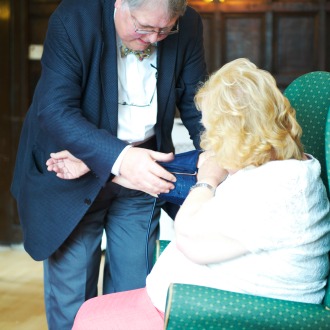Dilemma: Disgruntled patient

A patient has made a complaint about the care provided by one particular partner. He has approached both the Ombudsman and the GMC and repeatedly declined local resolution. He remains registered at the practice but complains online and in the waiting room. How should this be handled?
Remember the complainant is still your patient

Patient complaints are a common part of modern general practice and can help lead to reflection and an opportunity to refine and deliver even higher quality service for patients. It is important that patients who complain are not discriminated against.
Remember this man is still a patient of the practice and any action needs to be taken with this firmly in mind. It was right for the practice to seek a local amicable resolution and sad that this has not been possible. The doctor and the practice need to be sure that every avenue to achieve this has been thoroughly explored.
The posting of adverse comments on websites such as NHS Choices or on blogs can be hurtful, but it is important not to react to them precipitately. They are often anonymous. If they are abusive or involve an overt personal attack you are within your rights to ask the website moderator to take down the post.
If you find yourself in this situation then your LMC secretary will be able to provide good advice. The RCGP faculty structure also enables members to find experienced support in such difficult situations.
If there has been an irretrievable breakdown in the doctor-patient relationship, it may be desirable for the patient to seek registration at a different practice. If removal from the list is considered, it is important that the practice follows the correct process laid down in the GP contract and that every opportunity is taken to resume normal relations.
Dr Tim Ballard is a GP in Wiltshire and vice chair of the RCGP.
Offer the patient another chance to voice his concerns

Doctors sometimes want to remove a patient from their list. It may be acceptable to end a relationship where a patient has been persistently inconsiderate or unreasonable.
But the GMC makes clear that this should only be a last resort and that you shouldn’t end a professional relationship solely because the patient has complained.
Offer this patient another meeting so that he can voice his concerns in person or invite him to talk to you through an intermediary, such as the local area team.
He is entitled to refuse, but the ombudsman will not normally review a case where the local resolution process has not been exhausted, and the GMC has a triage system to exclude complaints that do not call into question a doctor’s fitness to practise.
In dealing with online comments, you have two choices – to respond, or ignore. Some practices reply to online criticism by thanking the person for their comments, apologising if they are not happy with the service or treatment and encouraging them to get in touch to discuss any concerns.
This is in line with the NHS complaints procedure, which emphasises that practices should be open and honest with complainants and learn from complaints to improve services. If you respond, remember to protect patient confidentiality.
If the website comments are untrue, abusive or obscene, you can alert the internet provider or moderator and ask for them to be removed. However, you must avoid disclosing any patient information.
Bear in mind that there is a risk that trying to have an online comment removed may further inflame the situation and may prompt the person to re-post their comments elsewhere.
Dr Phil Zack is a GP, and a medico-legal adviser at MDU.
You need to engage with the patient

The relationship between the patient and the practice has been seriously jeopardised by this apparent breakdown in communication, but engaging with the patient must be an immediate priority to prevent the situation escalating further.
Communicating effectively is central to addressing his current behaviour, understanding his reluctance to engage in local resolution and restoring his relationship with the practice. Mediation could open up a dialogue with the patient without further exacerbating the ongoing complaint.
Through conciliation the underlying issues that led to the current impasse can be explored; the initial handling of the complaint can be revisited, allowing for misunderstandings to be rectified; and further explanations can be given, using independent clinical or specialist advisers where necessary.
Key to a successful outcome will be a willingness on the part of the practice to learn from the experience and to share with the patient any actions that will be taken as a result of the complaint.
By ensuring that staff training in complaints handling highlights the value of conciliation, particularly where the doctor-patient relationship has deteriorated, the practice can reduce the risk of a similar situation arising in the future.
Anne Ward Platt is director of WP Medical & Professional Services Ltd and author of Conciliation in Healthcare: managing and resolving complaints and conflict.
Ask the patient to leave

The situation needs to be handled in the same way as a staff disciplinary procedure. There has been a breakdown in trust and communication and this needs to be resolved in a professional but sensitive manner.
Evidence of the grievance for both parties needs to be gathered, validated and recorded as indeed does all contact between the patient and practice.
It would appear that the respect and trust that should exist between doctor and patient has been destroyed. Such trust is vital in ensuring the healthcare needs of a patient are met. If it cannot be re-established it is in the best interests of that patient to seek another practice.
Having listened to the patient’s grievance – and assuming there is no substance and their attitude and behaviour do not change – I would reiterate the above paragraph in writing and would include assistance in finding them, through the CCG, an alternative practice in the area. I would copy this letter to the CCG and ensure this was actioned within a set period – say two weeks.
Dr Jim Sherifi is a GP in Sudbury, Suffolk









